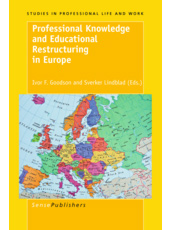Professional Knowledge and Educational Restructuring in Europe
Developing a Conceptual Framework for Understanding
Certainly restructuring has the features of a world movement that political elites are promoting but we can see how the different historical periodisations and trajectory crucially refract this process. In Sweden and Finland deeply entrenched systems of social democracy and professional expertise appear to be enduring. Now let us turn to the very different historical periodisations and trajectories in Southern Europe.
As we noted these countries: Portugal, Spain and Greece, came late to welfare systems and social democracy. Hence the restructuring world movement enters these societies at a different stage, and so to speak, at a different angle. The result of this trajectory of engagement is clear in the way that restructuring initiatives are refracted. In Portugal contestation and resistance seem endemic. The report is eloquent and very clear:
‘The strategies developed by the teaching profession have been mainly reactive: they express mostly a systematic rejection of the initiatives proposed by the central administrator than a proactive and anticipatory presentation of new forms of structuring and promoting the professional group….Only recently (since the end of the eighties have the unions discussed a structure for the teaching career, but even then, they have done so… in a primarily reactive manner, trying to keep things the way they were and resisting any attempts of change, rather than proposing structural changes that might improve the quality of professional practice and its outcomes.’
This Portuguese response shows how the role of periods and trajectories is a vital conceptual tool in understanding how restructuring initiatives are received by professional groups, received and then refracted. The periodisation and trajectories in Greece have considerable similarities and for the older generation who knew the revolutionary period can be clearly evidenced. Here though, generational restrictions can more clearly be drawn than was the case in Portugal where generational conformity seems more substantial.
